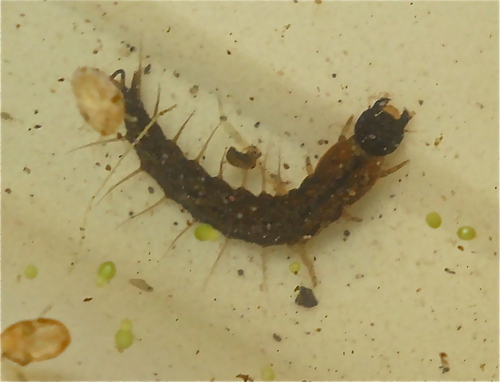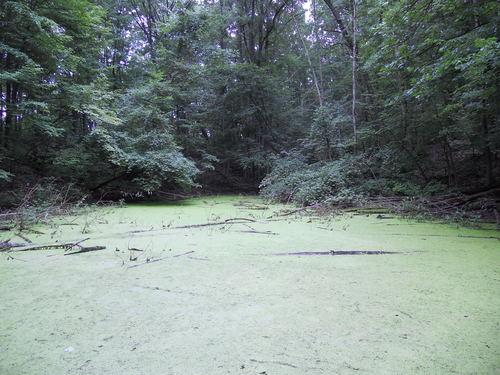Pondcast 32: Hellgramites, grampuses and go devils
August 8-14, 2010
During our visit to Black Pond in Week 32 of 2010, we encountered a few interesting insects known as dobsonfly larvae. These critters were about one inch long with several spiky projections on each side, known as filaments. Dobsonflies are also known as “hellgrammites,” “grampuses” and “go devils.”
I assume that the last colloquial term refers to "go (away) devil" as opposed to rooting for Satan. Perhaps the crescent-shaped pincers of the dobsonfly larva look like devil horns to some?

A dobsonfly larva is also known as a hellgramite, grampus or go devil.
Dobsonfly larvae will grow to two to three inches as they mature over a period of two to three years. In the pupal stage, they will move onto land near their larval watery home and develop into adults during their final winter and spring. Adults are most commonly found in late spring or early summer, most frequently at night. They are attracted to bright lights. When measured from the tips of their antennae to the ends of their wings, adult dobsonflies can reach lengths of five inches long. As adults, they live for only one week, during which time they mate and then die. Their eggs are laid near water on vegetation or rocks.
Dobsonfly larvae can bite, possessing crescent-shaped pincers, their mandibles or jaws, near their mouth. Adults do possess long mandibles but cannot harm humans with them since they cannot get enough leverage to break skin. Male dobsonfly mandibles are longer than those of females. Adult dobsonflies use their mandibles during mating.
As larvae, dobsonflies eat pretty much any aquatic animal they encounter, including insects, other invertebrates, tadpoles and fish. Adult dobsonflies do not typically eat.
Now that I know what to look for, I’ll be sure to keep my eyes out next summer when the dobsonflies mature into adults.

See all the Pondcast videos by visiting the YouTube channel of Stefan Szumko, AKA slugwhisperer at http://www.youtube.com/user/slugwhisperer. Stefan can be contacted at slugwhisperer@gmail.com.


Comments
Mark
Mon, Sep 20, 2010 : 11:16 a.m.
Technically, these are not Dobsonfly larvae, but are in the same family. True hellgrammites live in streams and rivers, whereas these are in a related group, the "fishflies" (not be confused the with colloquial "fishfly" in the Great Lakes, which is a Mayfly). It's hard to tell exactly from the photograph, but it is probably a larvae of the genus Chauliodes. For more info on Michigan species: http://insects.ummz.lsa.umich.edu/~ethanbr/aim/sp/megaloptera/sp_mom_corydalidae.html